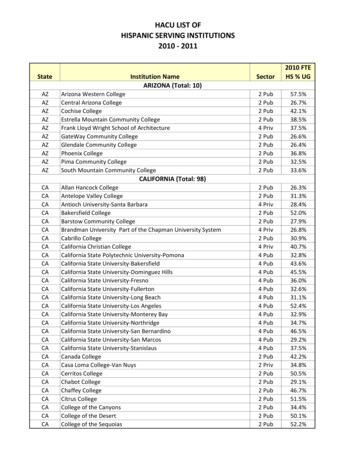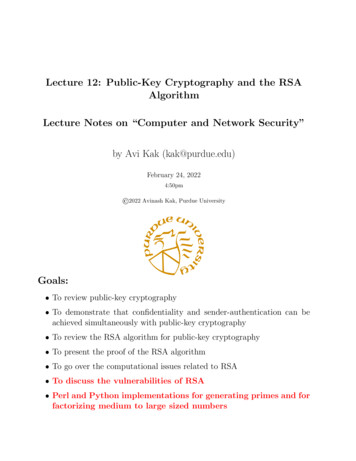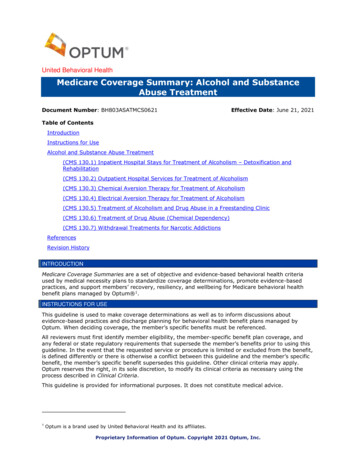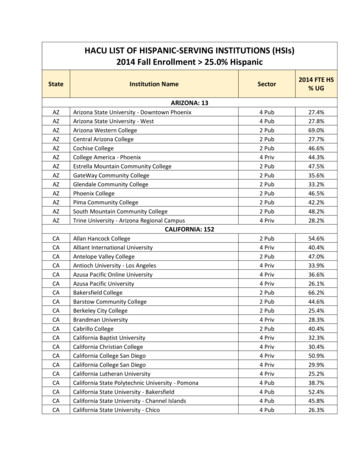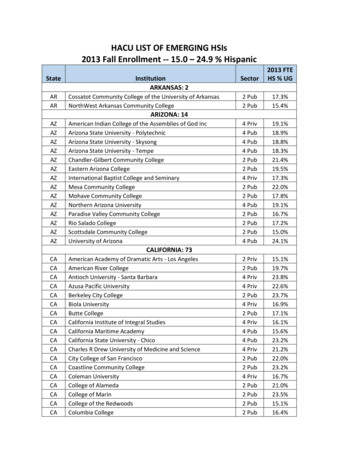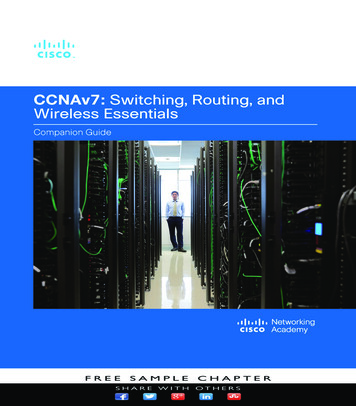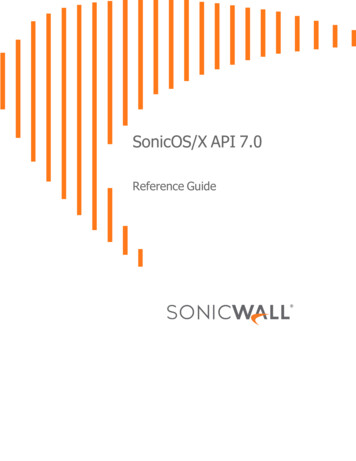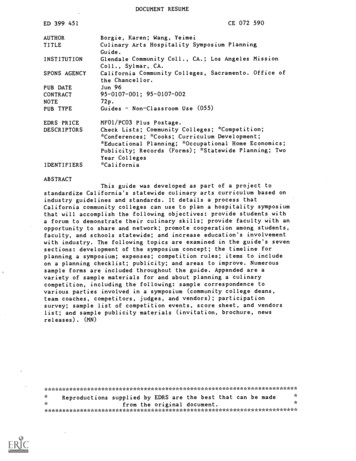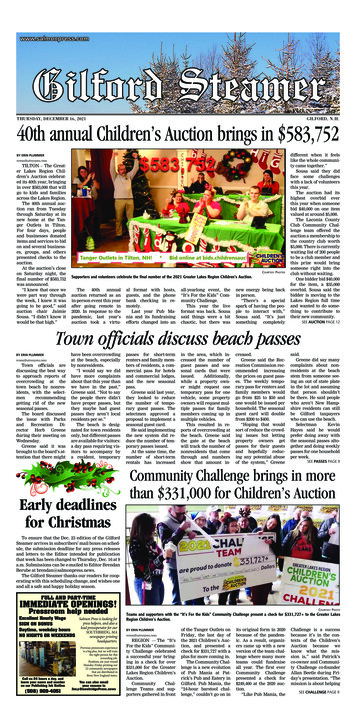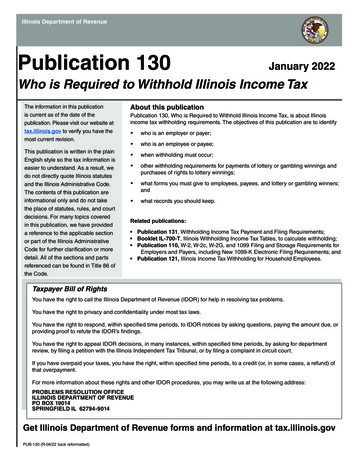
Transcription
Illinois Department of RevenuePublication 130 January 2022Who is Required to Withhold Illinois Income TaxThe information in this publicationis current as of the date of thepublication. Please visit our website attax.illinois.gov to verify you have themost current revision.This publication is written in the plainEnglish style so the tax information iseasier to understand. As a result, wedo not directly quote Illinois statutesand the Illinois Administrative Code.The contents of this publication areinformational only and do not takethe place of statutes, rules, and courtdecisions. For many topics coveredin this publication, we have provideda reference to the applicable sectionor part of the Illinois AdministrativeCode for further clarification or moredetail. All of the sections and partsreferenced can be found in Title 86 ofthe Code.About this publicationPublication 130, Who is Required to Withhold Illinois Income Tax, is about Illinoisincome tax withholding requirements. The objectives of this publication are to identify who is an employer or payer; who is an employee or payee; when withholding must occur; other withholding requirements for payments of lottery or gambling winnings andpurchases of rights to lottery winnings; what forms you must give to employees, payees, and lottery or gambling winners;and what records you should keep.Related publications: Publication 131, Withholding Income Tax Payment and Filing Requirements; Booklet IL-700-T, Illinois Withholding Income Tax Tables, to calculate withholding; Publication 110, W-2, W-2c, W-2G, and 1099 Filing and Storage Requirements forEmployers and Payers, including New 1099-K Electronic Filing Requirements; and Publication 121, Illinois Income Tax Withholding for Household Employees.Taxpayer Bill of RightsYou have the right to call the Illinois Department of Revenue (IDOR) for help in resolving tax problems.You have the right to privacy and confidentiality under most tax laws.You have the right to respond, within specified time periods, to IDOR notices by asking questions, paying the amount due, orproviding proof to refute the IDOR’s findings.You have the right to appeal IDOR decisions, in many instances, within specified time periods, by asking for departmentreview, by filing a petition with the Illinois Independent Tax Tribunal, or by filing a complaint in circuit court.If you have overpaid your taxes, you have the right, within specified time periods, to a credit (or, in some cases, a refund) ofthat overpayment.For more information about these rights and other IDOR procedures, you may write us at the following address:PROBLEMS RESOLUTION OFFICEILLINOIS DEPARTMENT OF REVENUEPO BOX 19014SPRINGFIELD IL 62794-9014Get Illinois Department of Revenue forms and information at tax.illinois.govPUB-130 (R-06/22 back reformatted)
Who is Required to Withhold Illinois Income TaxContentsGeneral InformationWho is required to withhold Illinois Income Tax?. 2Who is an employer or payer?. 3Who is an employee or payee?. 3Must I register to withhold Illinois Income Tax?. 3What happens after I register?. 3What should I do if I move or change my business name?. 3What should I do if I sell or transfer ownership of my business?. 3What if I no longer have employees or payees from whom I withhold Illinois Income tax or mybusiness has closed?. 3What if I am a seasonal employer?. 3Withholding Illinois Income Tax for My EmployeesWhen must I withhold Illinois Income Tax from my employee’s compensation?. 4When is compensation paid in Illinois?. 4When am I not required to withhold Illinois Income Tax?. 5Am I required to withhold income tax for another state if my employee is not an Illinois resident?.6What forms must my employee complete?. 6Do I owe other Illinois employment taxes?. 7What forms must I give my employee?. 7What forms must I submit to the Illinois Department of Revenue?. 7How do I complete Form W-2 for my employee showing income and withholding for Illinois?. 8How do I complete Form W-2G or Form 1099 for my payee showing withholding for Illinois?. 8Withholding Illinois Income Tax for Lottery or Gambling WinningsWhen must I withhold Illinois Income Tax from lottery winnings?. 9When must I withhold Illinois Income Tax from gambling winnings?. 9What forms must a winner complete?. 9What forms must I give each recipient?. 9What forms must I submit to the Illinois Department of Revenue?. 10Withholding Illinois Income Tax for Purchases of the Rights to Lottery WinningsDo I have an obligation to withhold Illinois Income Tax from purchased lottery winnings?. 10When must I withhold Illinois Income Tax from purchased lottery winnings?. 10Illinois Income Tax Forms for Determining Withholding from Employees and Lotteryor Gambling Winners. 11Office locations. 12General InformationWho is required to withhold IllinoisIncome Tax?Generally, you must withhold Illinois Income Tax from paymentsyou make for employee compensation (i.e., wages and salaries includingbonus, overtime, and commission pay) that is paid in Illinoisand from which you are required to withhold federal incometax, usually reported to a payee on Form W-2,non-wage income such as pensions, annuities, employmentincome, and sick pay, that you have agreed to voluntarilywithhold, usually reported to a recipient on Form 1099,Page 2 of 12 gambling winnings from an Illinois casino or race track,including sports wagering winnings, from which you arerequired to withhold federal income tax, and Illinois lotterywinnings of 1,000 or greater usually reported to a payee onForm W-2-G, or the purchase of the rights to Illinois lottery winnings, usuallyreported to the purchaser on Form 1099-MISC.However, there are some situations that do not require you towithhold Illinois Income Tax. See “When am I not required towithhold Illinois Income Tax?” for more information. We do notrequire a separate agreement for payments covered by a federalvoluntary withholding agreement. If requested by a payee,PUB-130 (R-06/22 back reformatted)
Who is Required to Withhold Illinois Income TaxGeneral Information (continued from Page 2)you can enter into a voluntary agreement and withhold IllinoisIncome Tax on Illinois income such as individual retirementaccounts (IRAs) or pensions. Note: If you agree to a voluntarywithholding agreement then you are required to withhold Illinoisincome tax.As a withholding agent (person who withholds incometax), you are liable for the taxes that you are required towithhold and that you volunteer to withhold. Because weare required to collect taxes (and issue assessments whenthese taxes are not paid), Illinois law states that the amountsrequired to be withheld and paid to us (and any penaltiesand interest) are considered to be a tax on you.Who is an employer or payer?You are an employer if you are any of the following: a person or organization who has an office or transactsbusiness in Illinois for whom a worker performs a serviceas an employee and you are the person who is liable towithhold and pay federal income taxes to the InternalRevenue Service (IRS). a person or organization who has an office or transactsbusiness in Illinois and who has control of the payment ofwages for employee services, if the employer does not havecontrol of the payment of wages. a payer who has an office or transacts business in Illinoisand who makes payments from which federal income taxesare withheld (e.g., gambling or lottery winnings).You are a payer if you are any of the following: a person or organization who pays non-wage income suchas pensions, annuities, employment income, and sick pay,that you have agreed to voluntarily withhold; a person or organization that pays gambling or lotterywinnings; or a person or organization who purchases the rights to lotterywinnings.See IRS Publication 15 Circular E, Employer’s Tax Guide, formore information.Who is an employee or payee?An employee is either a person who performs services subject to the legal controland direction of an employer, or an Illinois resident who receives payments on which federalincome tax is withheld by the employer.A payee is a person who receives non-wage income, gamblingor lottery winnings, or a lump sum payment for rights to lotterywinnings.See IRS Publication 15 Circular E, Employer’s Tax Guide, formore information.Must I register to withhold IllinoisIncome Tax?If you are required to or voluntarily withhold Illinois Income Taxfor your Illinois employees or payees, you must register with theIllinois Department of Revenue and tell us the date your Illinoispayroll will begin. Exception: Household employers should referPUB-130 (R-06/22 back reformatted)to Publication 121, Illinois Income Tax Withholding for HouseholdEmployees.To register your business you have the following options: register electronically with the online Illinois BusinessRegistration Application on MyTax Illinois (registrationconfirmation generally available in 1-2 days) at tax.illinois.gov, complete and mail Form REG-1, Illinois Business RegistrationApplication (registration confirmation generally available in 6-8weeks) and any necessary schedules, or visit one of our regional offices (see Page 12).You will receive a temporary tax account number unless you alreadyhave received your federal employer identification number (FEIN).What happens after I register?If you are a new registrant you are assigned to the monthly payerand quarterly return schedule. See Publication 131, WithholdingIncome Tax Payment and Filing Requirements. Visit our website attax.illinois.gov for more information regarding our electronic options.What should I do if I move or change mybusiness name?If your business name or address has changed from your last returnwithout changing owners, check the appropriate box on Form IL-941,Step 1, and enter your new business name and address in Step 1.File your completed return (Form IL-941) by its due date. You alsocan make changes to your business name by completing andsubmitting Form REG-3-C and updates to your address on MyTaxIllinois.What should I do if I sell or transferownership of my business?If you sell or transfer your business, you must file afinal return (IL-941) at the end of the final filing period.You may also be required to file Form CBS-1, Notice of Sale,Purchase, or Transfer of Business Assets, at least 10 days prior to thesale.What if I no longer have employees orpayees from whom I withhold Illinoisincome tax or my business has closed?If your business has permanently stopped withholding because ithas closed or you no longer pay wages, complete Step 2, Line B, onForm IL-941, check the box to indicate that this is a final return, andenter the date you stopped paying wages. You also can cease youraccount on MyTax Illinois.What if I am a seasonal employer?If you are a seasonal business and have ceased paying wagestemporarily (e.g., you will be rehiring employees during the nextyear), continue to file your returns. Even if you do not pay anywages or withhold any tax, you still must file Form IL-941 andcomplete a Schedule P, Illinois Withholding Schedule, for eachreporting period. If you had no withholding for the filing period,report zero on Line 2 of Form IL-941 and on the Schedule P, enteryour business name, FEIN, and zeros in both the income andwithholding columns.Page 3 of 12
Who is Required to Withhold Illinois Income TaxWithholding Illinois Income Tax for My EmployeesWhen must I withhold Illinois Income Taxfrom my employee’s compensation?You must withhold Illinois Income Tax when you withhold federalincome tax from compensation you paid in Illinois. Compensationis paid in Illinois when the employee’s services are “localized” inIllinois. This statement applies to all individuals except qualifyingresidents of Iowa, Kentucky, Michigan, and Wisconsin, andmilitary spouses. For further information, see “When am I notrequired to withhold Illinois Income Tax?”When is compensation paid in Illinois?The following are general rules for when compensation ispaid in Illinois.1.2.If the employee’s service is localized in Illinois because allof the service is performed in Illinois, then compensation isconsidered paid in Illinois and subject to Illinois income taxwithholding.If some of the employee’s services are performed outsideIllinois, but the services outside Illinois are incidental tothe services performed inside Illinois, then compensation isconsidered paid in Illinois and subject to Illinois income taxwithholding.The term “incidental” means any service which is necessaryto or supportive of the primary service performed by theemployee or which is temporary or transitory in nature orconsists of isolated transactions. The incidental service mayor may not be similar to the individual’s normal occupation solong as it is performed within the same employer-employeerelationship. That is, an individual who normally performsall of his service in Illinois may be sent by his employer toanother state to perform service which is totally different innature from his usual work or he may be sent to do similarwork. So long as the service is temporary or consists merelyof isolated transactions, it will be considered to be incidental.In every case, the ultimate determination to be made is whether the individual’s service was intended to be andwas in fact principally performed within Illinois and whether any service which was performed in anotherstate was of a temporary or transitory nature or aroseout of special circumstances at infrequent intervals.The amount of time spent or the amount of serviceperformed outside Illinois, in itself, should not be regardedas decisive in determining whether such service is incidentalto service performed within Illinois.3.If the employee is an Illinois resident and neither of the rules above apply and no other state’s taxes are withheld,then compensation is considered paid in Illinois and issubject to Illinois income tax withholding.4.If the employee’s compensation is not localized to any state under any of the rules aboveandPage 4 of 12 the employee performs significant service within Illinoisfor more than 30 working days, and the service performed within Illinois is nonincidental tothe employee’s service performed outside Illinois,then a portion of compensation is considered paid in Illinoisand subject to Illinois income tax withholding. The portion ofcompensation subject to Illinois withholding equals the totalcompensation paid to the employee multiplied by a fractionequal to the number of working days the employee spentwithin Illinois during the year divided by the total workingdays of the year.“Working day” means all days during the tax year in which theindividual performs duties on behalf of his or her employer.Days in which the individual performs no duties on behalfof his or her employer (e.g., weekends, vacation days, sickdays, and holidays) are not working days.A working day is spent within Illinois if: the individual performs service on behalf of the employerand a greater amount of time on that day is spent by theindividual performing duties on behalf of the employerwithin Illinois, without regard to time spent traveling, thanis spent performing duties on behalf of the employeroutside of Illinois; or the only service the individual performs on behalf of theemployer on that day is traveling to a destination withinIllinois, and the individual arrives on that day.Example: Mary is an Missouri resident who earned 60,000in wages from her employer for the tax year. During theyear, she performed services for her employer for 35 days inIllinois out of 250 total working days for the year. Accordingly,14 percent (35 working days divided by 250) of Mary’swages, or 8,400, was paid in Illinois and is subject to Illinoisincome tax withholding.Working days spent within Illinois do not include any day inwhich the employee is performing services in Illinois duringa disaster period solely in response to a request made to hisor her employer by the government of Illinois, by any politicalsubdivision of Illinois, or by a person conducting business inIllinois to perform disaster or emergency-related services inIllinois.“Declared State disaster or emergency” means a disaster oremergency event for which a Governor’s proclamation of a state ofemergency has been issued; or for which a Presidential declaration of a federal majordisaster or emergency has been issued.“Disaster period” means a period that begins 10 days priorto the date of the Governor’s proclamation or the President’sdeclaration (whichever is earlier) and extends for a periodof 60 calendar days after the end of the declared disaster oremergency period.“Disaster or emergency-related services” means repairing,renovating, installing, building, or rendering servicesPUB-130 (R-06/22 back reformatted)
Who is Required to Withhold Illinois Income Taxor conducting other business activities that relate toinfrastructure that has been damaged, impaired, ordestroyed by the declared State disaster or emergency.“Infrastructure” means property and equipment owned orused by a public utility, communications network, broadbandand internet service provider, cable and video serviceprovider, electric or gas distribution system, or waterpipeline that provides service to more than one customer orperson, including related support facilities. “Infrastructure”includes, but is not limited to, real and personal propertysuch as buildings, offices, power lines, cable lines, poles,communications lines, pipes, structures, and equipment5.For compensation for services performed by a nonresidentas a member of a professional athletic team, the amountthat is paid in Illinois is the total compensation for servicesperformed for the team during the year, multiplied by afraction equal to the number of duty days spent within Illinoisby the total number of duty days spent performing servicesfor the team. See Section 304(a)(2)(B)(iv) of the IllinoisIncome Tax Act for more guidance.Limited exceptions to the above rules:flight miles do not include miles flown over Illinois withouttaking off or landing.When am I not required to withholdIllinois Income Tax?Unless you enter into a voluntary withholding income taxagreement, you are not required to withhold Illinois Income Taxfrom the following: compensation paid to residents of Iowa, Kentucky,Michigan, and Wisconsin (due to reciprocal agreementswith each of these states); compensation paid to a non-military employee whosespouse is in the military, both of whom are residents of thesame state (other than Illinois), and are only in this state because the spouse is stationed here by the military or wherethe non-military spouse does not live in the same state asthe servicemember but elects to use their servicememberspouse’s state of residence for tax purposes as allowed bythe Veterans Benefits and Transition Act of 2018; compensation paid to a non-resident employee who hasperformed less than 31 days of service in Illinois and whosecompensation is not localized in Illinois under paragraphsone and two in the section “When is compensation paid inIllinois?” compensation paid to a non-resident employee whoseservice is performed entirely in another state; compensation paid to an Illinois resident whose service isperformed entirely in another state, and the compensation issubject to withholding in another state; qualifying payments made for personal service contracts orprizes awarded from contests conducted in Illinois (Sections1405.2 and 1405.3 of the Illinois Income Tax Act (IITA)); compensation that will not be included in the recipient’sbase income (e.g., annuity payments received from qualifiedemployee benefit plans); payments subject to withholding under IRC, Sections 3405or 3406; compensation paid by an employer under the jurisdictionof the Surface Transportation Board (STB), rail and motorcarriers, to a nonresident employee who performs regularlyassigned duties in more than one state; nonresident employees who work on aircraft for an aircarrier, perform regularly assigned duties in more than onestate, and do not earn more than 50 percent of thecompensation in Illinois (Illinois flight miles versus all flightmiles). Illinois flight miles do not include miles flown overIllinois without taking off or landing; compensation paid to a master or seaman on a vessel in theforeign, coastwise, intercoastal, interstate, or noncontiguoustrade, or an individual employed on a fishing vessel or anyfish processing vessel; compensation paid to an employee whose compensation isexempt from federal withholding requirements (e.g., “wages”paid to certain types of ministers); orThere are three limited exceptions when you are not required towithhold Illinois Income Tax. These exceptions are described asfollows.1.2.3.The employee works for an employer under thejurisdiction of the Surface Transportation Board (STB)and performs regularly assigned duties in more thanone state. Do not withhold Illinois Income Tax unless theemployee is an Illinois resident.The employee works on an aircraft for an air carrierand performs regularly assigned duties in more thanone state. Do not withhold Illinois Income Tax unless theemployee is an Illinois resident, or, if the employee is not anIllinois resident, the employee earns more than 50 percentof the compensation in Illinois (Illinois flight miles versus allflight miles). Illinois flight miles do not include miles flownover Illinois without taking off or landing.The employee works on a vessel and performs regularlyassigned duties in more than one state. Do not withholdIllinois Income Tax unless the employee is an Illinoisresident.Examples of compensation paid in Illinois:1 Your company employs an Indiana resident to make salesfor your company. You control your employee’s services,all of which are performed in Illinois. Compensation ispaid in Illinois because all of your employee’s services areperformed in Illinois.2 Your airline company employs a Missouri resident tofly to various destinations in the United States. Youremployee reports to and flies out of a terminal in Illinois.According to your records, 58 percent of your employee’scompensation (flight time in Illinois versus flight time toother destinations) is earned in Illinois. Therefore, you mustwithhold Illinois Income Tax on compensation paid in Illinoisto this employee because more than 50 percent of youremployee’s compensation was earned in Illinois. IllinoisPUB-130 (R-06/22 back reformatted)Page 5 of 12
Who is Required to Withhold Illinois Income Tax compensation paid to household employees as defined bythe Internal Revenue Service (IRS). (For more information,visit www.irs.gov and refer to IRS Publication 926.) Note:Pursuant to a voluntary federal agreement, if you withholdfederal income tax from your household employees, Illinoiswithholding is required. Also, you may enter a voluntaryIllinois withholding agreement. If you do withhold Illinoisincome tax, you may report and pay these taxes annually onForm IL-1040, Illinois Individual Income Tax Return, Line 22(No registration is required), or you may file Form IL-941quarterly (requires registration as a withholding agent).For more detailed information, see Publication 121, IllinoisIncome Tax Withholding for Household Employees.Examples for when withholding is not required.1 Your company, headquartered in Missouri, hires an Illinoisresident to install computer networks for your Missouribased clients. Your employee travels to your clients’ branchoffices in Illinois to complete network installation for a totalof 20 working days. Compensation is not paid in Illinoisbecause your company headquarters/ base of operations isin Missouri and your employee performed services in Illinoisfor less than 31 working days. Therefore, you do not withholdIllinois Income Tax. (See the note below.)2 Your company’s main office is in Indiana. You employ anIllinois resident to honor copy machine routine maintenancecontracts. Your employee works out of the main office andhas clients in both Illinois and Indiana. Your employee spent21 working days in Illinois. You are not required to withholdIllinois Income Tax because your employee’s spent less than31 working days in Illinois. (See the note below.)Although in these two examples you are notrequired to withhold Illinois Income Tax, your employees’income will be taxed by Illinois because they are Illinoisresidents. Therefore, your employees will file returns inboth states. We will give your employees a credit fortaxes paid to the other state. If the amount of tax paidto the other state does not cover the Illinois tax liability,your employees may need to make estimated incometax payments to Illinois.Am I required to withhold income tax foranother state if my employee is not anIllinois resident?If your employee is “paid in Illinois” and is a resident of Iowa,Kentucky, Michigan, or Wisconsin, you may, but are not requiredby Illinois law, withhold income tax for the other state.If your employee is a resident of a state with whom Illinois doesnot have a reciprocal agreement, you must withhold IllinoisIncome Tax on all income that is paid in Illinois. You may berequired to withhold tax for another state in which the employeeworks or resides. You should contact those states to determine ifyou are required to register as a withholding agent.Page 6 of 12What forms must my employeecomplete?Form IL-W-4Your employee must complete Form IL-W-4, Employee’s IllinoisWithholding Allowance Certificate. This is your record of thenumber of allowances that your employee is entitled to claimand would only be disregarded for the following circumstances: An employee claims total exemption from Illinois IncomeTax withholding, but has not filed a federal Form W-4, U.S.Employee’s Withholding Allowance Certificate, claiming totalexemption. The IRS has instructed you to disregard the employee’sfederal Form W-4.If a completed Form IL-W-4 is not filed, or you are required todisregard Form IL-W-4, you must withhold Illinois Income Taxwith no allowances.Most retirement income is exempt from IllinoisIncome Tax and no withholding is required, even if federalincome tax is withheld. However, retired taxpayers maywish to enter into voluntary withholding agreements to avoidhaving to pay estimated taxes on their taxable income.Retired taxpayers who enter into such voluntary withholdingagreements must also complete Form IL-W-4.If an employee claimed exemption from withholding on federalForm W-4, you still may be required to withhold Illinois Income Taxif the employee’s pay is greater than the Illinois allowance amount.See the example below.Before December 1 of each year, have your employee reviewhis or her Form IL‑W‑4. If your employee’s Illinois withholdingallowances change, the employee must complete a new FormIL-W-4.Example:Sam is single, does not have any dependents, and cannot beclaimed on another person’s tax return. He works for you parttime. Sam expects to earn 4,000 this year.Last year Sam earned 3,000, did not have a federal tax liability,and received a total refund of the federal income tax that waswithheld from his pay. Sam does not expect to owe any federalincome tax this year. Therefore, he claims exemption fromwithholding on his federal Form W‑4 for this year.Although Sam may not owe federal income tax, he will oweIllinois Income Tax because he is entitled to only one withholdingallowance. The exemption for this allowance is less than his totalpay. Therefore, you must withhold Illinois Income Tax from Sam’spay.PUB-130 (R-06/22 back reformatted)
Who is Required to Withhold Illinois Income TaxForm IL-W-5Form IL-W-5, Certificate of Residence in Illinois, is completed byan Illinois resident (not your employee) with whom you have awritten contract who is paid for performing personal services (e.g., artistic ormusical performances, or professional consulting services)and the income earned is taxable under Section 1405.2 ofthe IITA, or receives payment for prizes and awards from a contestconducted entirely in Illi
Publication 121, Illinois Income Tax Withholding for Household Employees. Get Illinois Department of Revenue forms and information at tax.illinois.gov Taxpayer Bill of Rights You have the right to call the Illinois Department of Revenue (IDOR) for help in resolving tax problems. You have the right to privacy and confidentiality under most .
